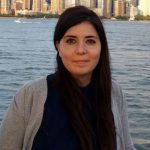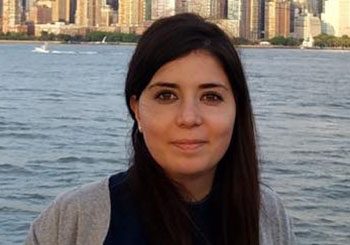We’re taking time to get to know the members of the GSA’s Early Career Scientist Committees. Join us to learn more about our 2019 early career scientist advocates.

Ana Mesquita
Policy Subcommittee
Albert Einstein College of Medicine
Research Interest
Autophagy is a catabolic process that occurs in all eukaryotic organisms analyzed to date. It is critical for the maintenance of cellular homeostasis. This is reflected by its association with a large array of pathologies and dysfunctions, including cardiovascular, neurodegenerative, as well as metabolic deregulation. In the case of heart problems, autophagy has been widely associated with atherosclerosis, diabetes, hypertension, and ischemic response.
Cellular stress can lead to extensive damage resulting in disease, and accumulation of damage can also worsen patient recovery. Several cell stress factors, such as oxidative stress or DNA damage, have already been indicated as risk factors for certain cardiopathies. Thus, understanding how cell clearance mechanisms operate is critical, both to reverse the effect of damaging factors and to prevent them.
I use Drosophila melanogaster to study the effect of cellular stress in endosomal Microautophagy, a mechanism with a great potential for degrading aggregated proteins in cells. Once we know how to make our cells “clean” themselves or correct defects that might arise, we will be one step closer to significantly decreasing the incidence or consequences of heart disease and stroke.
Quantifying thousands of autophagosomes and endosomes in a daily basis can sometimes be a cumbersome job. For this reason I developed SParQ – Streamlined PARticle Quantification software. A plugin for imageJ that enables the supervised, semi-automated quantification of fluorescent vesicles with high accuracy, SPARQ presents a friendly user-interface and is customizable for any type of image and any particle size.
As a PhD-trained scientist, you have many career options. What career paths interest you the most?
I’m most interested in a research career with a teaching component. As a scientist, I love that I am constantly challenged to innovate and keep up with a fast-changing landscape and, more importantly, have opportunities to be the one leading the way. I think there is no other profession where you can use your ideas and creativity as you do in a research setting.
As a biochemist working on autophagy for the past 10 years, I have developed an extensive knowledge on molecular pathways, cell biology, and genetic manipulation. I love understanding how things work and how I can add to the overall scientific knowledge. More recently, I discovered a keen interest for bioinformatics. I started wondering how could I apply new tools to my own work. As a result, I started learning programming and ended up finishing two data science courses (one in R and one in Python). I want to make sure that my research is cutting edge and that I am able to access the best tools at my disposal. From this newly acquired knowledge came my first software tool, SParQ (Streamlined PARticle Quantification).
A lot of work goes into experimentation and getting results that will help us understand how pathways work on a cellular level, which directly affects the directions of scientific research and the way we do science. Also, we live in a unique time where new technology is shaping the way we perceive science; you have the experimental scientist in the lab doing research, but you also have machines that can sequence thousands of samples in a small amount of time. This new era of big data and bioinformatics. The technology is fascinating, and I trust it will be a great asset that every scientist will rely on. As for me, I will be where things are being created and where innovation is taking place.
Apart from the hard science, I want to be able to combine my research with teaching because I’ve loved having the opportunity to mentor students. Having someone tell you that you are the reason they decided to pursue a PhD and become a scientist is priceless.
In addition to your research, how else do you want to advance the scientific enterprise?
I was a member of the Einstein Postdoctoral Association, and the Postdoctoral Representative in the Quality of Life Committee also at Einstein for the past two years. During this time, I have built a strong relationship with faculty, postdocs, and students in the New York area and am very aware of activities and initiatives that will help improve early scientists’ careers and overall science productivity.
I observed that postdoc concerns resided in two main areas:career development and general life resources. While some universities have a great support network and offer things like childcare, tax preparation, and good housing arrangements, others are simply not keeping up. My job as a committee member was to listen to what was missing and try to create opportunities and dialogue between the postdoctoral community and the decision makers. We need to make sure younger scientists have access to the tools they need to thrive not only in their research but also in their personal lives, and this passes by promoting easy access to resources.
Professional development, ample training opportunities, and career services are key tools that can help postdocs grow their careers. This was one of the main reasons I decided to enroll in GSA’s Leadership program—help promote career development opportunities, resources, and fellowships. I think collaboration with associations like the GSA, American Association for the Advancement of Science, and the National Postdoctoral Association is the key to make these resources more widely available to postdocs.
As a leader within the Genetics Society of America, what do you hope to accomplish?
Being part of the leadership program has given me the opportunity to network with the top scientists in the field of genetics, learn from them, and have a sense of community that is beyond my institution. During the next two years, I want to generate more opportunities and resources for the research community and also create more discussion and awareness on everything science-related, such as promoting access to information about fellowships, job opportunities, career development programs, and other scientific initiatives. I am fascinated by ideas and ways of putting those ideas into initiatives, and this is one of the best channels to do exactly that.
Previous Leadership Experience:
Quality of Life Committee Member – Albert Einstein College of Medicine
Member – Einstein Postdoctoral Association
Council on Genomics and Precision Medicine – American Heart Association
Master’s Student Mentor – Université Paris Diderot (Genetics) and ISIFC Paris (Biomedical Engineering) at Albert Einstein College of Medicine































